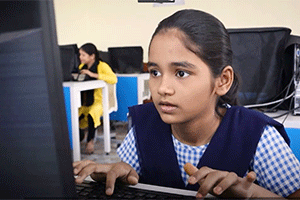At Share & Care, our mission is to improve the lives of those most in need in rural India, and we accomplish this by partnering with local NGOs to provide education, accessible healthcare, skills training, and community enrichment programs. Instilling the next generation with the confidence and skills they need to become financially independent and passionate about giving back creates a ripple effect throughout the entire community, uplifting entire villages and creating sustainable, long-lasting change.
Watch the videos below for a small glimpse into some of the projects your support makes possible.
Women Empowerment: Giving Women the Skills and Tools to Become Entrepreneurs
The Samridhi Saksham project empowers over 500 women from 30 rural villages by providing the training, support, and materials needed to launch their own sewing and embroidery businesses. Watch the video below to meet a few of the entrepreneurs and to see how the project trains them to create beautiful, handmade embroidery.
Educate 2 Success: Building Digital Literacy in Rural Schools
Share & Care has sponsored the creation of digital labs throughout several states in rural India through partnership with the Y4D Foundation, giving under-resourced students access to new technologies and helping them become digitally literate. In the video below, learn how these labs equip students to thrive in our increasingly digital world.
Educate 2 Graduate: Helping Young Women Achieve Their Dreams
Share & Care partners with the Lila Poonawalla Foundation, an organization dedicated to supporting brilliant but financially challenged young women who aspire to succeed in their post-graduate studies and beyond. Watch the video below to meet some of the program’s beneficiaries and learn more about how this foundation helps these young women develop educationally, professionally, and personally.
Village Upliftment: Improving Quality of Life For Entire Villages
Lokmitras, or “friends of the people,” work to uplift entire villages by organizing community projects and offering support to individual villagers. In this video, hear from Anil, a Lokmitra in the Waghjipur village, and Pravinsingh Bhalu Singh, a local farmer, about how they have worked together to facilitate a water storage project with the potential to benefit everyone in the area.
English Translation
- Hello, my name is Anil, and I work as a LokMitra in the village of Waghjipur, located in Kapdwanj district. I would like to discuss how to store rainwater into the ground to increase the water level. I have a farmer friend named Pravinsingh Bhalu Singh, who has conducted experiments at his house. I would like to know his response.
- Hello, Anilbhai, our village friend. He approached me and mentioned that Pravinbhai has a water store project. I asked him what the benefits would be. He explained that we should collect and utilize the rainwater that falls by storing it in the ground. He suggested digging or boring a hole for this purpose. I inquired if we could use the existing borehole, He said yes we can but he informed me that the costs of using pipes and other materials have increased. I replied saying that it’s not a problem, and if it’s beneficial, we should proceed. We took some measurements, and since my house is closer, we decided to use 4-5 pipes. We connected them to use the existing borehole, which was already dug up to a certain depth. Anilbhai accompanied me, and said i will assist you in the process. We dug a trench and laid the pipes, ensuring that the roof water flows directly into the borehole. Additionally, I installed a water tank on the roof. If the water level becomes too high, it will now flow directly into the drain. Initially, I had stopped using this borehole, but now I have started using it again, and the water supply is much higher than that of the previous borehole. After about 15 minutes, the water flow decreases briefly but then starts again. The previous borehole used to provide less water, but this new one delivers a sufficient amount in approximately 10 to 11 minutes. After it reaches full capacity, I turn it off, and if I need water again, I can simply restart it. Therefore, I have benefited from this improvement. If you share this with others, please let them know about the advantages. Within 10 to 15 minutes, I have access to an abundant water supply. If all the villagers follow the same approach, everyone will benefit.
Healthcare 2 Unreached: Providing Medical Care in Rural Villages
Share & Care helps provide healthcare to underserved rural areas of the state of Manipur in India through mobile medical clinics, healthcare for mothers and children, and medical education within the community.


